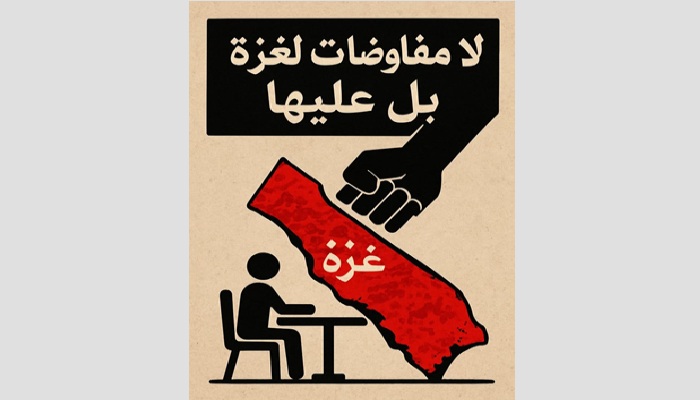
Afrasianet - Dr. Hisham Okal - In Cairo, the Palestinian factions met again in October 2025 under the banner of unity, reconciliation and to discuss Trump's so-called peace plan, but behind that heavy table sat an old failure in new clothes.
Two years after war and destruction, the Palestinians did not come out of square one, but returned to it more divided and less confident. The Cairo meeting was supposed to be an honest national review, but it turned into another formality in which slogans are raised and end at the edge of microphones.
Now the Gaza crisis is being managed as if it were a purely humanitarian issue, not a national issue.
The whole world is trying to turn the tragedy of Gaza into a bag of flour and a can of milk, in a scene that hides the depoliticization of the conflict.
It is no longer a question of liberation or national rights, but of introducing an additional diesel truck or allowing an aid convoy to pass.
Thus, the Palestinian issue is redefined as a livelihood crisis rather than a national project of liberation.
This deliberate shift from the political to the humanitarian is not innocent, but part of a broader process of emptying Palestinian national consciousness.
This is accompanied by the remarketing of the two-state solution under the cover of the United States and Israel that guarantees the security of the occupation and not the rights of the Palestinian people.
What is even more worrying is that some factions have followed this slide gasping for relief instead of liberation, reducing all their sacrifices to how a fuel truck passes through the crossing.
The Palestine Liberation Organization (PLO) has been absent from the scene as an institutional actor.
What was once the tent of the community has now become an administrative structure without a soul.
The Palestinian Authority turned it into a subordinate political arm, and confiscated from it its historic decision as the sole legitimate representative of the Palestinian people.
With this continuous discharge, the relationship between the Organization and the people has been disintegrated, as have the ties between the factions themselves.
On the other hand, Hamas continues to adhere to a parallel legitimacy outside the framework of the organization, acting as an alternative entity rather than as a national component.
This insistence deepened the structural and structural division, and made Gaza and the West Bank two separate entities that are connected only by a broken flag.
The division is no longer merely political, but a stand-alone structure that lives on failure and fuels its continuity.
In addition, what is being discussed in closed rooms about an international administration of the Gaza Strip through figures in the orbit of the Trump administration, as if the Gaza Strip is a land without people.
These proposals, even if they are adorned with the slogan of stability, are nothing more than a new tutelage that takes us back to Paul Bremer's experience in Iraq when he ran a country from outside it and turned it into ashes.
History teaches us that no one can rule Gaza except its people, and that any political project that does not emanate from within the Palestinian fabric is doomed.
Trump may give Hamas a passing green signal today, but he is able to turn the tables in an instant.
However, the real danger is not in Trump's volatility, but in the absence of a Palestinian national project that withstands the fluctuations of the outside.
In the midst of this flabby scene, a new question has emerged in Cairo:
Where is Fatah?
The mother movement was absent, while the so-called Democratic Reform Movement led by Dahlan attended.
Is it a tactical decision to avoid granting Hamas free political legitimacy?
Or is it an uncalculated withdrawal from an arena in which the Palestinian scene is being rearranged?
The Dahlan movement did not let the opportunity pass.
He attended, spoke, and filled the void of Fatah representation in front of the media and mediators.
Fatah's official leadership seemed to have taken on the role of spectator in a battle that was once its battle.
Sharp angle ask
The factional meeting in Cairo discussed the second phase and the options of the Gaza administration, but the official Fatah was absent or reduced its representation while the Democratic Reform Movement, led by Dahlan, attended.
Fatah's absence is due to complex political and organizational calculations: a desire to avoid tacit recognition of Hamas as an equal partner, a keen effort to avoid appearing in a landscape that is not controlled by the organization, internal divisions over leadership and succession, and fears of a volatile U.S. position in the event of a change of administration. The movement also feared paying an internal media price without real political gain.
On the other hand, the Dahlan movement took advantage of the vacuum to present itself as an alternative Fatah façade open to Egyptian mediators ready to participate in post-war arrangements within the concept of a "technocrat committee." His presence carried a message of internal pressure on the official leadership, and a sign that Fatah's representation is no longer exclusive to the Ramallah center, and those who leave their seats for a long time will find others sitting in their place. He speaks on his behalf.
Dr. Hisham Okal - Professor of Crisis Management and International Relations

